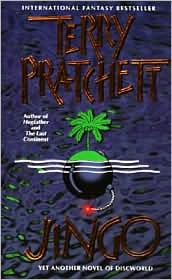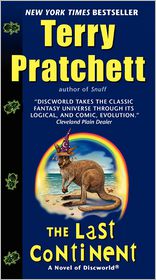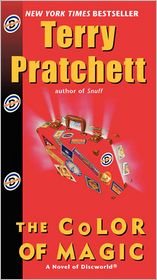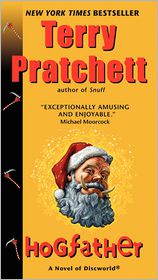The Great A’Tuin Swims On: Remembering Terry Pratchett
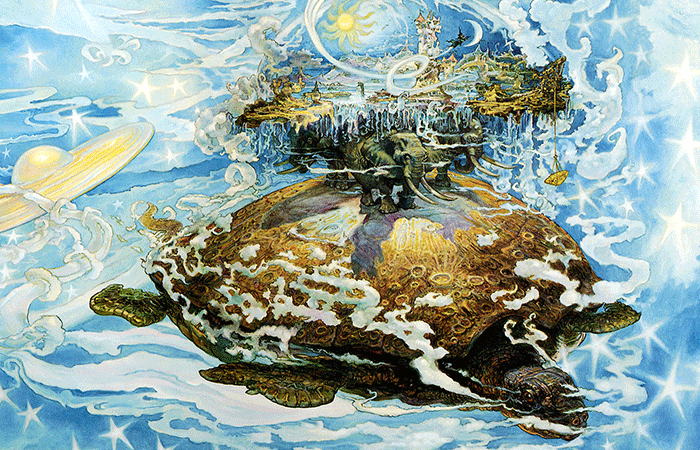 It’s never easy to lose a beloved author, but yesterday’s passing of Sir Terry Pratchett caused particularly acute pain. Few writers, after all, could claim as expansive a body of work, let alone one as witty and wise about the ways of the world, and life, and death (and Death).
It’s never easy to lose a beloved author, but yesterday’s passing of Sir Terry Pratchett caused particularly acute pain. Few writers, after all, could claim as expansive a body of work, let alone one as witty and wise about the ways of the world, and life, and death (and Death).
Below, a few of our writers share personal stories of their connections to Pratchett’s work. If you’ve yet to read him, consider these strongly felt arguments to remedy that immediately.
Jingo (Discworld Series #21)
Jingo (Discworld Series #21)
Paperback $10.75
Diana
It was the luckiest accident of my entire reading life: I was stuck on campus for several hours with nothing to read, and so I wandered into the college bookstore. I didn’t know who Terry Pratchett was, and I certainly didn’t know that over the next several months I would go on to devour most of his published works. All I knew was that the cover had a tropical island on it that was also a bomb, and for whatever reason that went straight into my brain and said “BUY ME!” (Looking at it now, that cover of Jingo is just awful. Who knows.)
More than any other novelist, and perhaps more than any other thinker, Terry Pratchett is who I come back to. So thank you, Sir Terry Pratchett, for the Trousers of Time. Thank you for Lady Sybil, and Death, and especially for Granny Weatherwax. Thank you for L-space and for the Librarian. Thank you for Havelock Vetinari, and for Big Fido, and for Gaspode, and thank you for all the rest.
Thank you, thank you, thank you.
Diana
It was the luckiest accident of my entire reading life: I was stuck on campus for several hours with nothing to read, and so I wandered into the college bookstore. I didn’t know who Terry Pratchett was, and I certainly didn’t know that over the next several months I would go on to devour most of his published works. All I knew was that the cover had a tropical island on it that was also a bomb, and for whatever reason that went straight into my brain and said “BUY ME!” (Looking at it now, that cover of Jingo is just awful. Who knows.)
More than any other novelist, and perhaps more than any other thinker, Terry Pratchett is who I come back to. So thank you, Sir Terry Pratchett, for the Trousers of Time. Thank you for Lady Sybil, and Death, and especially for Granny Weatherwax. Thank you for L-space and for the Librarian. Thank you for Havelock Vetinari, and for Big Fido, and for Gaspode, and thank you for all the rest.
Thank you, thank you, thank you.
The Last Continent (Discworld Series #22)
The Last Continent (Discworld Series #22)
Paperback $9.99
Nicole
That death found Terry Pratchett yesterday was a shock to the legions who had made his Discworld a second home. Then again, no one has done so much for Death as the fertile mind of Terry Pratchett. Granny Weatherwax is feisty. Rincewind is comically miserable. Sam Vimes is wryly self-defeating. The Librarian is ook. But it’s Death, in his continual struggle to learn the ways of the living, who is the most whole, the most human, the most like us, and he is, in my insignificant opinion, Pratchett’s greatest character.
He’s flawed, as any skeletal embodiment of doom would be, but Pratchett’s Death is endearingly curious and well-meaning, never more apparent than in his attempt to replace the Hogfather (“ER. HO. HO. HO.”). That such a stereotypically canonical representation of the Grim Reaper, the enemy of us all, could charm the pants off wizened fantasy readers is a triumph, yet unsurprising. That sort of counterintuitive voodoo is what Terry Pratchett did, does, and will continue to do as long as there are books and eyes to read them.
Over the course of three decades of Discworld, Pratchett took tried-and-true fantasy tropes, turned them on their head and, in doing so, created one of the most fully realized fictional worlds to ever exist. That type of ingenious consistency is irreplaceable. In The Last Continent, Death observes, “PEOPLE’S WHOLE LIVES DO PASS IN FRONT OF THEIR EYES BEFORE THEY DIE. THE PROCESS IS CALLED ‘LIVING.’” By that mark, Terry Pratchett had one heck of an afterlife pre-show.
Nicole
That death found Terry Pratchett yesterday was a shock to the legions who had made his Discworld a second home. Then again, no one has done so much for Death as the fertile mind of Terry Pratchett. Granny Weatherwax is feisty. Rincewind is comically miserable. Sam Vimes is wryly self-defeating. The Librarian is ook. But it’s Death, in his continual struggle to learn the ways of the living, who is the most whole, the most human, the most like us, and he is, in my insignificant opinion, Pratchett’s greatest character.
He’s flawed, as any skeletal embodiment of doom would be, but Pratchett’s Death is endearingly curious and well-meaning, never more apparent than in his attempt to replace the Hogfather (“ER. HO. HO. HO.”). That such a stereotypically canonical representation of the Grim Reaper, the enemy of us all, could charm the pants off wizened fantasy readers is a triumph, yet unsurprising. That sort of counterintuitive voodoo is what Terry Pratchett did, does, and will continue to do as long as there are books and eyes to read them.
Over the course of three decades of Discworld, Pratchett took tried-and-true fantasy tropes, turned them on their head and, in doing so, created one of the most fully realized fictional worlds to ever exist. That type of ingenious consistency is irreplaceable. In The Last Continent, Death observes, “PEOPLE’S WHOLE LIVES DO PASS IN FRONT OF THEIR EYES BEFORE THEY DIE. THE PROCESS IS CALLED ‘LIVING.’” By that mark, Terry Pratchett had one heck of an afterlife pre-show.
The Color of Magic (Discworld Series #1)
The Color of Magic (Discworld Series #1)
In Stock Online
Paperback $9.99
Sam
The first four times I read Terry Pratchett, I couldn’t make it through an entire book. The fifth time, I picked up The Truth, and it was the funniest thing I’d read short of Douglas Adams. From that point on, it was like some kind of a key turned in a lock. I read his other books voraciously and enjoyed each one more than the last. While none of the wizard books or the Night’s Watch had quite the effect on me as his “Industrial Revolution” series, (pushing Discworld into the steam-era progress) or The Colour of Magic (since I was a fan of all the things he was making fun of), a connection was made. I eagerly pressed his books into the hands of friends and family alike, hoping it would catch on the same way.
I wouldn’t be writing about books if it wasn’t for him, if it weren’t for those first moments of trying to shove his books into everyone’s hands, for the fact that no one around me seemed to know this amazing, fantastic author or his dense, ridiculous comic epic. I probably wouldn’t have found the urge to talk about other books. I wouldn’t have imagined my own vast worlds the same way. Hell, I wouldn’t even have my appreciation for the running gag (Pratchett could extend jokes across decades).
I can’t claim any kind of relationship with Sir Terry. The closest I ever even got to the man was at New York ComiCon, when Sean Astin decided to run an impromptu Discworld panel in the middle of a different one. But he left an impact on my life. Without him, there wouldn’t be a “book club.” Without the “book club,” I wouldn’t be doing what I do now.
When you get to his house, Terry, play an extra hand of bridge for me, would you?
Sam
The first four times I read Terry Pratchett, I couldn’t make it through an entire book. The fifth time, I picked up The Truth, and it was the funniest thing I’d read short of Douglas Adams. From that point on, it was like some kind of a key turned in a lock. I read his other books voraciously and enjoyed each one more than the last. While none of the wizard books or the Night’s Watch had quite the effect on me as his “Industrial Revolution” series, (pushing Discworld into the steam-era progress) or The Colour of Magic (since I was a fan of all the things he was making fun of), a connection was made. I eagerly pressed his books into the hands of friends and family alike, hoping it would catch on the same way.
I wouldn’t be writing about books if it wasn’t for him, if it weren’t for those first moments of trying to shove his books into everyone’s hands, for the fact that no one around me seemed to know this amazing, fantastic author or his dense, ridiculous comic epic. I probably wouldn’t have found the urge to talk about other books. I wouldn’t have imagined my own vast worlds the same way. Hell, I wouldn’t even have my appreciation for the running gag (Pratchett could extend jokes across decades).
I can’t claim any kind of relationship with Sir Terry. The closest I ever even got to the man was at New York ComiCon, when Sean Astin decided to run an impromptu Discworld panel in the middle of a different one. But he left an impact on my life. Without him, there wouldn’t be a “book club.” Without the “book club,” I wouldn’t be doing what I do now.
When you get to his house, Terry, play an extra hand of bridge for me, would you?
Hogfather (Discworld Series #20)
Hogfather (Discworld Series #20)
In Stock Online
Paperback $9.99
Jon
Instead of my own thoughts, I’ll let Sir Terry speak for me. From Hogfather:
‘All right,’ said Susan. ‘I’m not stupid. You’re saying humans need… fantasies to make life bearable.’
REALLY? AS IF IT WAS SOME KIND OF PINK PILL? NO. HUMANS NEED FANTASY TO BE HUMAN. TO BE THE PLACE WHERE THE FALLING ANGEL MEETS THE RISING APE.
‘Tooth fairies? Hogfathers? Little—’
YES. AS PRACTICE. YOU HAVE TO START OUT LEARNING TO BELIEVE THE LITTLE LIES.
‘So we can believe the big ones?’
YES. JUSTICE. MERCY. DUTY. THAT SORT OF THING.
‘They’re not the same at all!’
YOU THINK SO? THEN TAKE THE UNIVERSE AND GRIND IT DOWN TO THE FINEST POWDER AND SIEVE IT THROUGH THE FINEST SIEVE AND THEN SHOW ME ONE ATOM OF JUSTICE, ONE MOLECULE OF MERCY. AND YET—Death waved a hand. AND YET YOU ACT AS IF THERE IS SOME IDEAL ORDER IN THE WORLD, AS IF THERE IS SOME… SOME RIGHTNESS IN THE UNIVERSE BY WHICH IT MAY BE JUDGED.
‘Yes, but people have got to believe that, or what’s the point—’
MY POINT EXACTLY.
Adam
I will always treasure Terry Pratchett and Discworld for their awkward embrace of our silly mortality, best summed up in this quote from Sir Terry himself, in The Art of Discworld:
“Sometimes I get nice letters from people who know they’re due to meet [Death] soon, and hope I’ve got him right. Those are the kind of letters that cause me to stare at the wall for some time.”
Share your memories of Pratchett and his work in the comments.
Jon
Instead of my own thoughts, I’ll let Sir Terry speak for me. From Hogfather:
‘All right,’ said Susan. ‘I’m not stupid. You’re saying humans need… fantasies to make life bearable.’
REALLY? AS IF IT WAS SOME KIND OF PINK PILL? NO. HUMANS NEED FANTASY TO BE HUMAN. TO BE THE PLACE WHERE THE FALLING ANGEL MEETS THE RISING APE.
‘Tooth fairies? Hogfathers? Little—’
YES. AS PRACTICE. YOU HAVE TO START OUT LEARNING TO BELIEVE THE LITTLE LIES.
‘So we can believe the big ones?’
YES. JUSTICE. MERCY. DUTY. THAT SORT OF THING.
‘They’re not the same at all!’
YOU THINK SO? THEN TAKE THE UNIVERSE AND GRIND IT DOWN TO THE FINEST POWDER AND SIEVE IT THROUGH THE FINEST SIEVE AND THEN SHOW ME ONE ATOM OF JUSTICE, ONE MOLECULE OF MERCY. AND YET—Death waved a hand. AND YET YOU ACT AS IF THERE IS SOME IDEAL ORDER IN THE WORLD, AS IF THERE IS SOME… SOME RIGHTNESS IN THE UNIVERSE BY WHICH IT MAY BE JUDGED.
‘Yes, but people have got to believe that, or what’s the point—’
MY POINT EXACTLY.
Adam
I will always treasure Terry Pratchett and Discworld for their awkward embrace of our silly mortality, best summed up in this quote from Sir Terry himself, in The Art of Discworld:
“Sometimes I get nice letters from people who know they’re due to meet [Death] soon, and hope I’ve got him right. Those are the kind of letters that cause me to stare at the wall for some time.”
Share your memories of Pratchett and his work in the comments.
